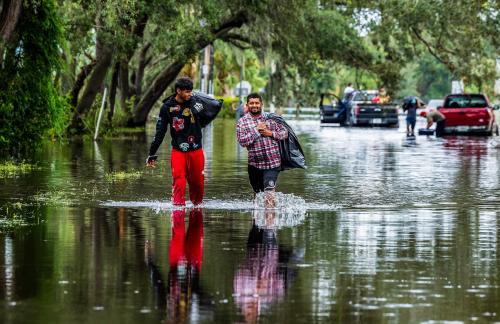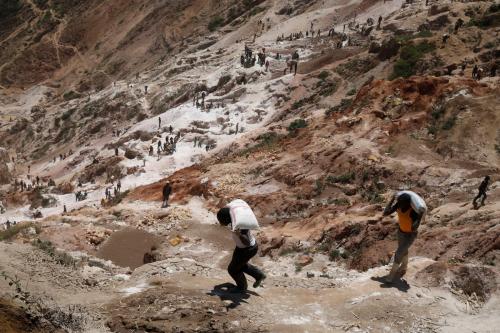Secretary of State Hillary Clinton, in the first visit to India by a top Obama administration official, engaged her hosts on two major issues facing the world: nuclear non-proliferation and climate change. On the eve of her visit, Brookings President Strobe Talbott wrote that Indians, like many Americans, still need to be persuaded to see the urgency of prompt action on these two issues.
When Hillary Clinton arrives in India on Friday, the US secretary of state will no doubt strike the upbeat tone that befits relations between the world’s two largest democracies. But she is expected also to engage her hosts candidly on two issues that have been contentious in the past and may be in future: climate change and nuclear non-proliferation.
In both areas, President Barack Obama’s positions are radically different from his predecessor’s. Unlike George W. Bush, Mr Obama understands the need for a rules-based international system that will regulate and reduce levels of greenhouse gas emissions and nuclear weaponry. In particular, Mr Bush, like the Republican-controlled US Senate of the late 1990s, opposed the Kyoto protocol on climate change and the ratification of the Comprehensive Test Ban Treaty (CTBT). He also had little use for the Nuclear Nonproliferation Treaty (NPT), even though it was largely an American initiative going back to the dawn of the cold war.
Those Bush policies suited many Indians. In their view, a global regime to restrict carbon emissions could hinder India’s growth, while the CTBT and the NPT blocked their right to develop the nuclear-weapons capability their government demonstrated when it conducted a series of tests in 1998. Under Mr Bush, the US and India negotiated a pact on co-operation in civil nuclear power that will, when the details of its implementation are worked out, grant India an exemption from the terms of the NPT.
Mr Obama, however, is committed to ratifying the CTBT, strengthening the NPT, and pursuing other treaties to prevent the spread of dangerous material and technology. He also intends for the US to be part of the international effort to replace the Kyoto protocol with a treaty-based climate-control regime including India, China and other emerging powers.
As a result, on both proliferation and climate change, many Indians regard Mr Bush with nostalgia and Mr Obama with muted apprehension. Mrs Clinton, however, is seen as a staunch friend of India. Her trip there as first lady in 1995 helped break the ice in US-Indian relations after 50 years of estrangement, paving the way for President Bill Clinton’s visit in 2000. She is therefore in an ideal position to deliver a message in New Delhi that is both reassuring and cautionary.
The US administration knows it cannot coax or bully India into formally joining the NPT, nor will it renege on the civil nuclear deal it inherited from Mr Bush. At the same time, Washington policymakers hope that India’s Congress party-led government, now that it has been returned to power with an increased mandate, will join the US in tightening the verification authorities of the International Atomic Energy Agency, accelerating negotiations to stop the production of fissile material (the stuff at the core of nuclear warheads) and bringing the CTBT into force.
These steps would make India’s region safer, since Pakistan might follow suit in a positive direction, just as it did in a negative one when it conducted a nuclear test shortly after India’s in 1998. A similar appeal to self-interest might prevail with respect to climate change. Since much of India’s population lives in rural and coastal areas, it is acutely vulnerable to the devastation of agricultural lands and rising sea levels that come with global warming.
Key figures in India are beginning to accept the idea of a global compact on climate change. However, they are focused on the 12-to-1 disparity between the average American’s carbon footprint and the average Indian’s. Therefore they want progress towards parity in the final agreement. If the US achieves the 80 per cent cut in emissions by 2050 that Mr Obama supports, the gap between the US and Indian footprints per capita would shrink dramatically.
Indians (like many Americans) need to be persuaded to see the urgency of prompt action. There are few voices more persuasive than that of the Indian scientist R. K. Pachauri, the head of the Intergovernmental Panel on Climate Change who shared the 2007 Nobel Peace Prize with Al Gore. He believes that the world has about six years to impose drastic and effective reductions on greenhouse gases. That will only happen if Mr Pachauri’s and Mrs Clinton’s governments can make common cause.
The writer, president of the Brookings Institution, conducted a strategic dialogue with India on behalf of President Clinton from 1998 to 2001
The Brookings Institution is committed to quality, independence, and impact.
We are supported by a diverse array of funders. In line with our values and policies, each Brookings publication represents the sole views of its author(s).



Commentary
Op-edA Tough Message to India on Climate Change, Non-proliferation
July 16, 2009